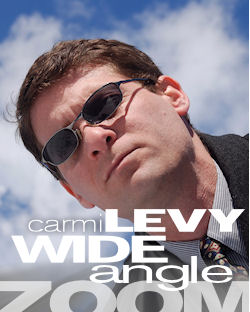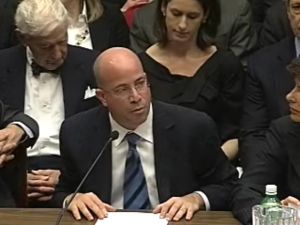By Scott M. Fulton, III, Betanews
 Last September, the US Justice Dept. objected to the proposed terms of a settlement between Google and the Authors' Guild, which would have enabled Google to publish out-of-print titles in its Google Books catalog. The theory of the settlement at the time was, if authors or rights holders are given enough time to respond to a request to stand up for their rights -- say, at least several months -- and they don't do so, then that's as good as acquiescence.
Last September, the US Justice Dept. objected to the proposed terms of a settlement between Google and the Authors' Guild, which would have enabled Google to publish out-of-print titles in its Google Books catalog. The theory of the settlement at the time was, if authors or rights holders are given enough time to respond to a request to stand up for their rights -- say, at least several months -- and they don't do so, then that's as good as acquiescence.
Since that time, on orders of US District Judge Denny Chin, the two disputing groups have worked on a revised settlement. But yesterday, the Justice Dept. -- representing the United States' interests in the matter -- filed a second objection to the settlement. Although Google and the Authors' Guild made progress, US attorneys say, Google still appears to take the position not only that it can strike bargains on behalf of copyright holders, but that only Google can do so -- a position which they say the law does not allow them to take.
"The ASA [amended settlement agreement] suffers from the same core problem as the original agreement: It is an attempt to use the class action mechanism to implement forward-looking business arrangements that go far beyond the dispute before the Court in this litigation," write the attorneys, on behalf of Deputy Assistant Attorney General for Antitrust William Cavanaugh. "As a consequence, the ASA purports to grant legal rights that are difficult to square with the core principle of the Copyright Act that copyright owners generally control whether and how to exploit their works during the term of copyright. Those rights, in turn, confer significant and possibly anticompetitive advantages on a single entity -- Google. Under the ASA as proposed, Google would remain the only competitor in the digital marketplace with the rights to distribute and otherwise exploit a vast array of works in multiple formats. Google also would have the exclusive ability to exploit unclaimed works (including so-called 'orphan works') without risk of liability."
Orphan works were one of the principal problems with the settlement agreement as originally proposed, which attorneys concede was slightly improved upon in the amended form. Originally, Google intended to claim the right to act on behalf of the authors or rights holders of orphan works, unless they spoke up for themselves.
But a kind of Catch-22 managed to unravel the rest of the amended agreement, from the attorneys' perspective: Because Google has never expressed any intent to sell the books it intends to publish -- only make them available for free reading electronically -- it avoided taking any position on the matter of claiming any rights to sell that material. Such a claim, the attorneys concede, "would have been legally indefensible, and thus would have been at odds with Google's entire pre-settlement book search strategy, which was premised upon staying within colorable 'fair use' grounds."
Apparently in an attempt to be thorough, the amended settlement deals explicitly with the same rights Google tried to avoid -- the rights to sell orphan works, among others. And because it does so even though Google didn't intend to, the settlement may fail one of the critical legal tests of any such settlement: specifically, by attempting to settle in the future a claim that Google is not making at present.
But later, the attorneys return to their original claim: that Google is claiming rights it might not have exclusively:
"A core issue that arises out of the parties' effort to resolve this matter is the ability of Google, and no other entity, to compete in a marketplace that the parties seek to create. Nothing in the ASA addresses this concern...There is no serious contention that Google's competitors are likely to obtain comparable rights independently. For example, Amazon -- Google's likely chief rival digital book distributor were the ASA to be approved -- began scanning copyright-protected books in 2002, after first securing permission of the works' rightsholder(s). To date, Amazon has amassed a library of approximately three million digital titles...This impressive number pales in comparison to the tens of millions of books Google has scanned or is poised to scan if the ASA is approved. The suggestion that a competitor should follow Google's lead by copying books en masse without permission in the hope of prompting a class action suit to be settled on terms comparable to the ASA is poor public policy and not something the antitrust laws require a competitor to do."
Another tenet of Google's claim of exclusive rights was the focus of an objection to the amended settlement filed last week by the Free Software Foundation. It's a unique objection, in that the FSF would prefer to not have its due royalties negotiated on its behalf, even if the amount is tallied at zero. Doing so, it claims, would go against the spirit of the free licenses which cover open source documentation and manuals.
"When a copyright holder's license allows Google to distribute and display a work such that it may be included in Google Book Search, Google should be obligated to follow those terms," writes FSF license compliance engineer Brett Smith. "If those terms are unacceptable to Google, the company should simply refrain from including the work in the Google Book Search database. The proposed settlement agreement generally allows Google to include works in Google Book Search unless a specific reason exists to disallow it. The FSF has no objection to this approach for works that have been published under terms that never contemplated inclusion in a large digital database, as is the case with most works in the agreement's scope. However, copyright holders using Free licenses have demonstrably considered such a possibility, and set forth terms for such inclusion. Google should respect the freedoms that these licenses offer to the public and comply with their terms."
Copyright Betanews, Inc. 2010









 Which brings us to the iPad launch, which delighted the folks who pay the bills because it meant they were delivering their message to a larger-than-usual audience. Apple's announcement gave online publishers a unique opportunity to enjoy higher-than-usual advertising revenues as a direct result of this audience. When big stuff happens in the tech world, people go online to learn about it and decide whether or not it makes sense for their needs. Traffic spikes as newbies and old-timers alike hit the Web looking for information, insight, and guidance. Everything else -- like run-of-the-mill news stories in the wake of the earthquake in Haiti -- gets shunted off to the side as sites do their best to meet demand. And drive it even further.
Which brings us to the iPad launch, which delighted the folks who pay the bills because it meant they were delivering their message to a larger-than-usual audience. Apple's announcement gave online publishers a unique opportunity to enjoy higher-than-usual advertising revenues as a direct result of this audience. When big stuff happens in the tech world, people go online to learn about it and decide whether or not it makes sense for their needs. Traffic spikes as newbies and old-timers alike hit the Web looking for information, insight, and guidance. Everything else -- like run-of-the-mill news stories in the wake of the earthquake in Haiti -- gets shunted off to the side as sites do their best to meet demand. And drive it even further.
 During the few comments he was asked to make during his testimony before the House Telecommunications and Internet Subcommittee earlier today, NBC Universal President and CEO Jeff Zucker was
During the few comments he was asked to make during his testimony before the House Telecommunications and Internet Subcommittee earlier today, NBC Universal President and CEO Jeff Zucker was